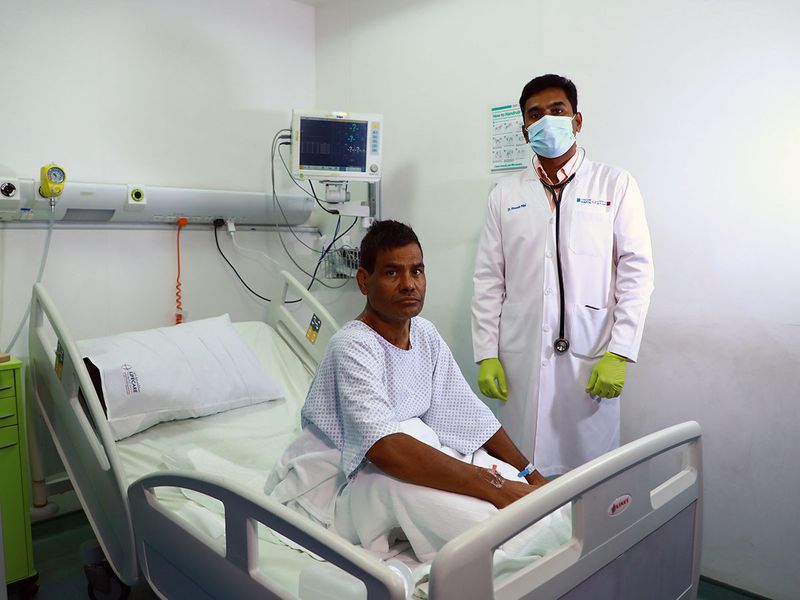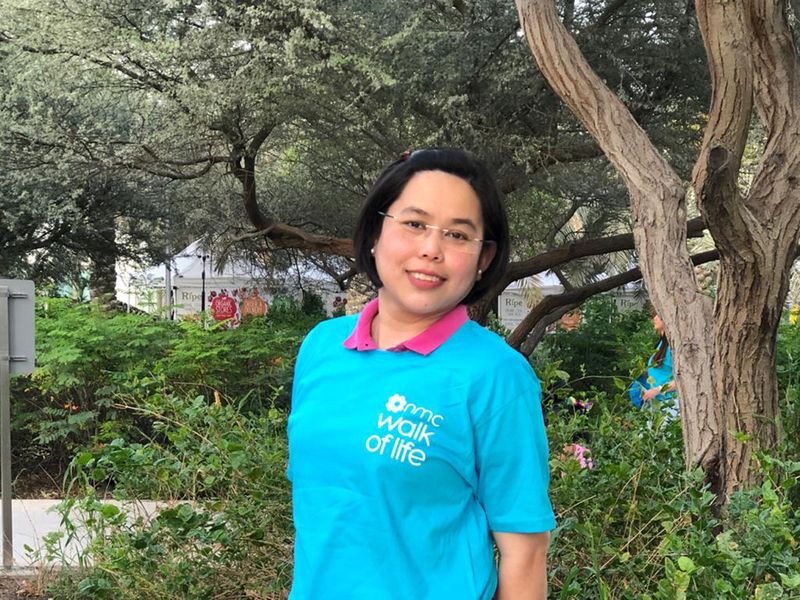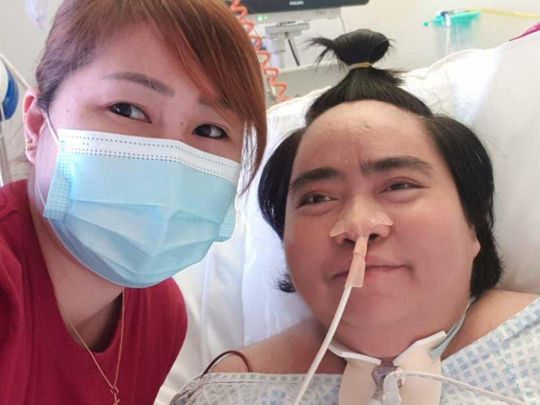Theresa Acosta was hospitalised with COVID-19 on May 31. Like most coronavirus cases, the Filipino administrative professional in Abu Dhabi was expected to recover in a couple of weeks. She recovered, but after 157 days. Acosta spent five months in Burjeel Hospital, battling coronavirus and the complications resulting from it.
According to the World Health Organisation (WHO), most COVID-19 patients will be back on their feet within two to six weeks. In some cases, symptoms can return or linger for months. These patients are called “long-haulers”.
So was Acosta a long-hauler? No, her illness wasn’t lingering. Acosta’s lungs were affected, and it took a very long time to cure. Here’s her story:
“I never expected it [the recovery] to be so long, because I was just feeling breathless. I didn’t even have a fever when I went to the hospital,” Acosta, 38, told Gulf News.
“She [Acosta] was admitted with shortness of breath, mild fever and cough. But her condition deteriorated fast and had to be transferred to the intensive care unit (ICU),” said Dr Nehad Halawa, anaesthesia specialist and ICU doctor at the hospital. By then, Acosta’s blood oxygen saturation was a low 84 per cent [Normal saturation range is 95 to 100 per cent].
“After three weeks, Acosta was in a state of happy hypoxia [when the patient does not feel discomfort despite low blood oxygen saturation],” Dr Halawa said. She also had pneumothorax [air between her lungs and chest wall, which can lead to lung collapse], Dr Rania Zein Eldin, respiratory specialist, added.
Even after putting her on a ventilator, Acosta’s blood oxygenation levels remained low, and things took a turn for the worse by the end of July. “It was a difficult situation, and as per regular protocols, there wasn’t much we could do. At the suggestion of Dr Yasser Farraj, intensivist, we put her on ECMO (extracorporeal membrane oxygenation) although this isn’t regular practice,” Dr Halawa said. That worked.
“In Acosta’s case, 20 to 30 per cent of her lungs have also become fibrotic, so she can expect to have a blood oxygen saturation that is lower than usual in the long term. But her body will adapt, and she can look forward to being otherwise healthy, as long as she eats well and undertakes exercise,” Dr Halawa added.
A five-month hospitalisation comes with a hefty price tag. Burjeel Hospital helped, so did the Filipino community. Another patient at the hospital donated Dh3,000 worth of medication to help treat Acosta. And she had the support of her friend Aiza Andres, who frequently checked on her. Together with the care team at Burjeel, Andres celebrated Acosta’s 38th birthday at the hospital. Now, she supports her friend at home, nursing her back to strength.
Acosta has a word of advice for COVID patients. “I would advise anyone with COVID-19 symptoms to immediately seek medical attention. This illness is not something you want to take lightly.”
Here’ a look at some patients who recovered from COVID-19 after lengthy spells at hospitals:

Image Credit: Supplied
A recovery after 115 days in ICU
Abu Taher Ismail spent 115 days in the intensive care unit (ICU), battling complications arising out of COVID-19 infection. The 55-year-old Bangladeshi has comorbidities that made treatment and recovery difficult.
“The patient, who is diabetic and hypertensive, had complications with his kidney during COVID-19 infection. In such cases, patients face 75 to 90 per cent mortality. So it is amazing to see him on his feet, and we hope he will only feel better and better with time,” Dr Abeesh Pillai, a nephrologist at Lifecare Hospital Abu Dhabi, told Gulf News.

Image Credit: Supplied
Cancer patient beats COVID-19
Mary J, a Filipino unit manager at a popular amusement centre in Abu Dhabi, is a breast cancer patient who has been undergoing chemotherapy since March 2019 at the NMC Specialty Hospital in Abu Dhabi. The 39-year-old was diagnosed with COVID-19 on May 11 during regular tests for cancer patients at the hospital.
With early diagnosis and effective management by the hospital, Mary was able to recover soon and after testing negative, resumed her chemotherapy from June 14.
The illnesses of Acosta and Ismail doesn’t classify as a typical long-haul COVID-19, which is when symptoms persist even after the patient tests negative for coronavirus. The treatment were long-drawn, because of the complications.
So, what’s long haul COVID-19?
Most COVID-19 patients recover within 14 days. But for some, the novel coronavirus symptoms can last weeks or months. They are called “long haulers”. These people have recovered from the worst impacts of COVID-19 and have tested negative, but they still have symptoms that include shortness of breath, fatigue, chills, pain, fever, cognitive problems, variance in blood pressure and heart rate, among others.
This condition can affect anyone: old and young, healthy people and people with comorbidities (underlying ailments like diabetes, hypertension and others). Some long-haulers have had to be hospitalised with severe COVID-19 attack, while some others had only mild symptoms.
Coughing
Fatigue
Body aches
Joint pain
Shortness of breath
Loss of taste and smell
Sleeping difficulties
Other reported long-term symptoms
- Palpitations (Pounding heart)
- Depression
- Brain fog (Difficulty with thinking and concentration)
- Muscle pain
- Intermittent fever
What are the serious complications for long-haulers?
Serious long-term complications are less common, according to the US Centers for Disease Control and Prevention. The reported complications affect different organ systems in the body, and they include:
Cardiovascular: inflammation of the heart muscle
Respiratory: Lung function abnormalities
Renal: Acute kidney injury
Dermatologic: Rash, hair loss
Neurological: Smell and taste problems, sleep issues, difficulty with concentration, memory problems
Psychiatric: Depression, anxiety, changes in mood
Why do long haulers continue to experience COVID-19 symptoms?
There is no consistent reason. One theory says that the symptoms persist because the virus must be still in their bodies in a minute form. Another theory says that it’s a manifestation of an overactive immune system, although the infection has been overcome.
How’s COVID-19 and depression linked?
Some people who survived severe symptoms of COVID-19 following an extended stay in hospitals (often with assistance such as ventilators to breathe) are traumatised by the experience. Experts say that survivors of severe COVID later develop post-traumatic stress syndrome (PTSD), depression and anxiety.
COVID-19 had been around only ten months. Because it’s difficult to predict long-term outcomes from the relatively new virus, scientists are looking at the long-term effects seen in related viruses, such as severe acute respiratory syndrome (SARS-CoV-1).
Long-term COVID-19 and chronic fatigue
Some infectious disease experts have speculated that long-term COVID-19 might be a form of what is called chronic fatigue syndrome, or myalgic encephalomyelitis/chronic fatigue syndrome (ME/CFS). Unfortunately, this syndrome too is not understood well, yet.
Chronic fatigue syndrome is a complex disorder manifesting through extreme fatigue that worsens with physical or mental activity — and doesn’t improve with rest — a condition faced by people who had recovered from SARS. Experts now suspect the same may be true for people who have had SARS-CoV-2.

